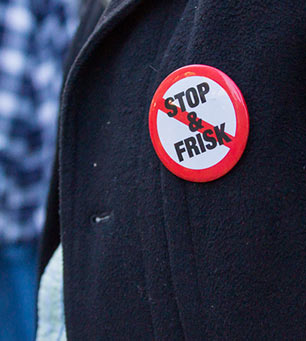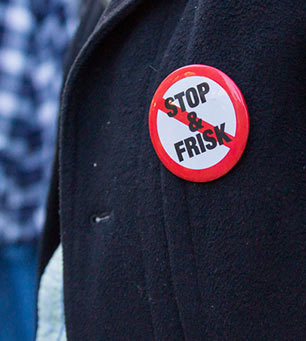Honest, paywall-free news is rare. Please support our boldly independent journalism with a donation of any size.
 (Photo: Joshua Kehn / Flickr)Is fixing “stop and frisk,” the NYPD’s policy of frisking first (mostly blacks) and asking questions later – whether unconstitutional or not – even worth the bother?
(Photo: Joshua Kehn / Flickr)Is fixing “stop and frisk,” the NYPD’s policy of frisking first (mostly blacks) and asking questions later – whether unconstitutional or not – even worth the bother?
Not according to former first deputy police commissioner of the New York City Police Department (NYPD) John F. Timoney, who, in a New York Times Op-Ed last month, bemoaned the “real costs of policing the police” when it came to reforming the controversial policy.
According to Timoney, while it was obvious that “no one . . . should be stopped by a police officer on the basis of skin color,” the reform program demanded by Judge Shira A. Scheindlin, who found the NYPD’s policy unconstitutional in that it was a violation of Fourth and 14th Amendment protections, was simply not worth the cost or administrative hassle. In any event, Timoney optimistically opined, the police already got the message, and within a few years the problem would “already have fixed itself.”
Let’s put aside his argument for the time being and shed some light on the issue by asking an entirely different question: Why did his byline have him writing from Manama, Bahrain?
He wasn’t on vacation. Timoney, after some 30 years with the NYPD, followed by stints as head of police in Philadelphia and Miami, took a job in December 2011 as “special adviser on policing” with the Bahrain Interior Ministry. He was brought on board after Bahrain came under heavy international criticism for its response to its “Arab Spring” protest movement, which included mass detentions, torture and killing.
Even prior to taking on this position, however, Timoney was no stranger to controversy, particularly in his dealings with political protest here in the United States. While chief of police in Philadelphia, for instance, he presided over some 400 arrests during the 2000 Republican National Convention protests, with the vast majority of cases rejected in court. He was also accused of cooperating with the infiltration of protester groups by state police.
After moving to Miami, he orchestrated a heavily-criticized and heavy-handed response to demonstrations at the 2003 Free Trade Area of the Americas meeting, using methods that were deemed a “disgrace for the community” by Circuit Judge Richard Margolius. Indeed, his approach there has become known as the “Miami Model,” a derogatory moniker bestowed by the journalist Jeremy Scahill, who covered it.
Given this experience, Bahrain was arguably an entirely consistent career move for Timoney.
Bahrain’s crisis had begun in February 2011, after pro-democracy protests broke out in the wake of unrest in Tunisia and Egypt. The initially peaceful protesters – who camped out in Manama’s “Pearl Square” – soon found themselves under violent attack by Bahrain’s security forces, who beat them with batons and fired shotguns at close range. A state of emergency was declared, and troops were called in from Bahrain’s ally Saudi Arabia to help settle things.
The organization Physicians for Human Rights (PHR) brought to light some remarkable human rights violations committed during these months, including a “systematic and coordinated attack” on medical personnel, who were presumably thought to be sympathizers with the protesters whom they treated. Physicians were abducted by police – both from their homes in the middle of the night and even in the midst of performing surgery. Armed guards militarized the nation’s main referral hospital, torturing inpatients accused of participating in protests, extracting bogus confessions, beating doctors and abducting patients upon discharge for further interrogation. Multiple detainees died under suspicious circumstances.
Now, to be fair, Timoney has argued that his role in going to Bahrain was to professionalize the force and to prevent further abuses. But some might argue that working as a high-level adviser to the police of an authoritarian and abusive government crosses a certain line.
And though Bahrain has made some reforms in response to a major 2011 human rights inquiry, many people, according to Amnesty International’s 2013 report, remain in prison for oppositional activities, while human rights activists continue to be detained, security forces continue to use excessive force, and incidents of torture continue to be reported.
Meanwhile, in July, a criminal court acquitted military officers who had been charged with torturing detainees and medical personnel. In August, new decrees were issued by the government in an attempt to ban protests, while further curbs on political groups were announced on September 3.
So let’s circle back from Bahrain to the Bronx, Brooklyn and elsewhere in NYC, where a systematic and widely criticized policy of “stop and frisk” has been called unconstitutional, “racially discriminatory,” and tantamount to “indirect racial profiling” by a federal judge. No need to worry, says self-appointed “Top Cop” Timoney: Everything will fix itself.
A word to the wise: being told by a police adviser in the presumably lucrative employ of an authoritarian Gulf monarchy not to fret about authoritarian police tactics back at home is not particularly persuasive.
On the contrary, it only strengthens one’s moral conviction that we unquestionably need more freedom – on both continents.
Media that fights fascism
Truthout is funded almost entirely by readers — that’s why we can speak truth to power and cut against the mainstream narrative. But independent journalists at Truthout face mounting political repression under Trump.
We rely on your support to survive McCarthyist censorship. Please make a tax-deductible one-time or monthly donation.
